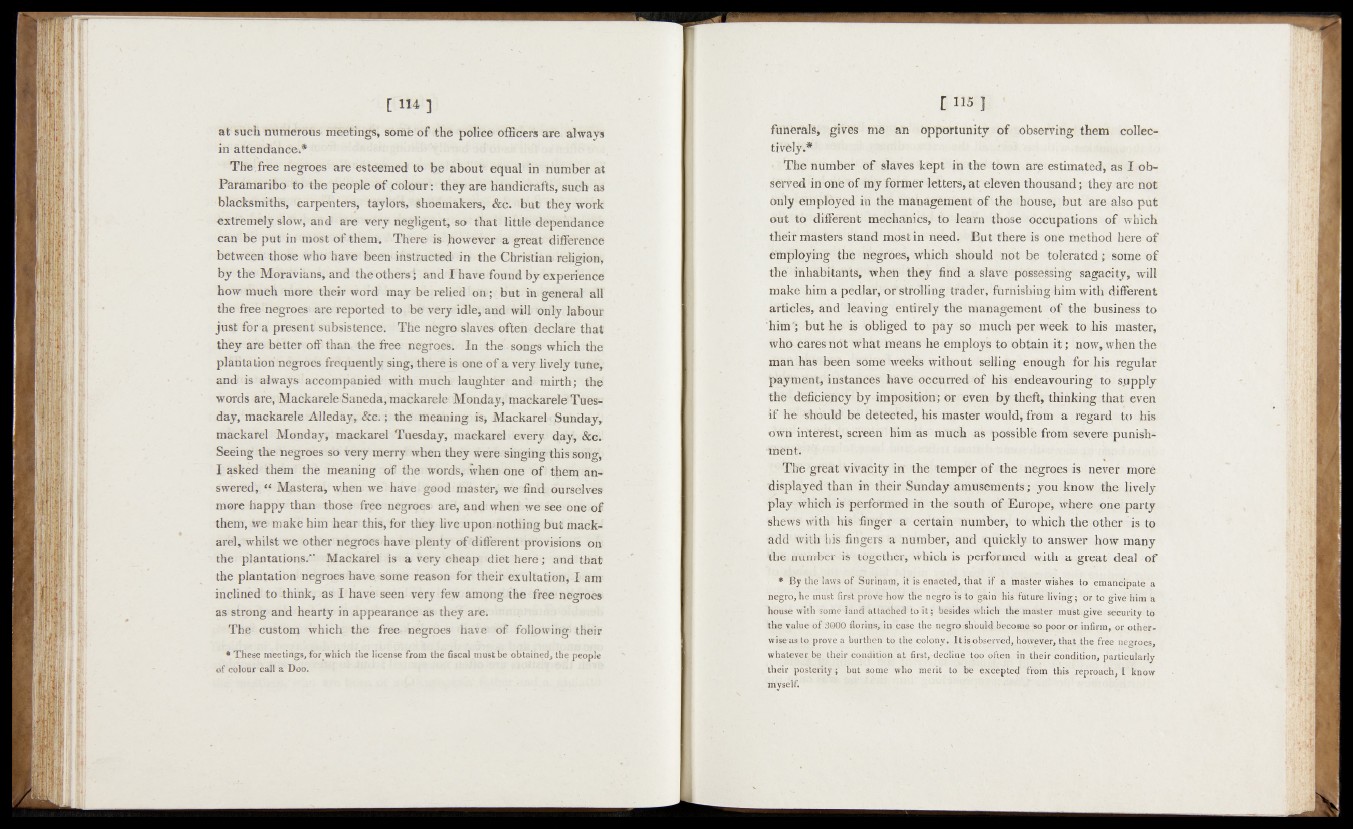
at such numerous- meetings, some of the police officers are always
in attendance**
The.free negroes are esteemed* to be about equal in number at
Paramaribo to the people of colour : they are handicrafts, such as
blacksmiths* carpenters, taylOrS, shoemakers, &c. but they work
extremely slow, and are very négligent, so that little dépendance
can be put in most of them. There- is however a great difference
between those who hâve been- instructed! in the Christian religion,
by the Moravians, and the others-; and I have found by experience
how much more their word; may be relied on ; but in general all
the free'negroes: are reported to be very idle, and will only labour
jusjt for a present subsistence. The negro-slave* often declare that!
they are better off than the free negroes; In the songs which the
plantation negroes frequently sing,.-there is one of ,a very lively tufte*
and; is always accompanied with much laughter and mirth; the
words are, Mackarele Saneda, mackarele Monday;: mackarele Tuesday,
mackarele Alleday, &c. ; the meaning isj Mackarel ■ Sunday,
mackarel Monday, mackarel Tuesday, mackarel every day, &c.
Seeing the negroes so very merry when they were singing'this so®^
I asked them the meaning of the- words, wbenone oflt|iem answered,
“ Masters, when we have-good master, we find, ourselves»
more happy than those free negroes: are, and whenweseeonteof
them, we make him hear this, for they live upomnothing but mackarel,
whilst we other negroes have plenty of different provisions on
the plantations/' Mackarel is a veiy cheap diet here ; and that
the plantation negroes have some reason for- their- exultation, l am'
inclined to think, as I have seen very few among the free-negroes
a* strong and hearty in appearance as they are. -
The custom which- the free negroes have of following» their
* These meetings, for which the license from the fiscal must be obtained, the people
o f colour call a Doo.
fuhferals, gives me an opportunity of observing them collectively.*
» The number öf slaves kept in thé töwn are estimated, as I observed
in one of my fórmër letters, at elèvên thousand; they are not
only employed in the management of the house, but are also put
out to different mechanics, to learn those occupations of which
theif masters stand most in need. But there is one method here of
employing the negroes, which should not be tolerated; some of
the ‘inhabitants, Whefa they find a slave possessing sagacity, will
make him a pedlar, or strolling trader, furnishing him with different
articles, and leaving entirely the management of the business to
him'; but he is obliged to pay so much per week to his master,
who cares not what means he employs to obtain it ; now, when the
man has been some weeks without selling enough for his. regular
payment, instances have occurred of his endeavouring to supply
the deficiency by imposition; or even by theft, thinking that even
if he should be detected, his master would, from a regard to his
oWh intèïëst, screen him as much as possible from seyefe punishment'./
'
The great vivacity in' the temper of the negroes is never moré
displayed than in their Sunday amusements ; you know the lively
play which is performed in the south of Europe, Where one party
ShdWs' With his fingér a Certain number, ÉÉ which the other: is to
add with his fingers a number, and -quickly to answer how many
the number is together, which is performed with a great deal of
* By the laws of Surinam, if is enavcted, that if a 'mêTster w'fehés to emancipate a
negro, he must first prove-how tHe negfó is to 'gain his fu'ture living; dr to give him a
house with some land altached to it ; besides which the master must,give security to
the value o f 3000 florins, in base the negro should becoaije ?so poor or infirm, or other»
wise as to prove a burthen to the colony. I t|s observe^, however, that the free negroes,
whatever, be thhk condition at first?-decline too p|ten in their condition, particularly
their posterity; but some who merit to be excepted from this reproach, ! know
myself.